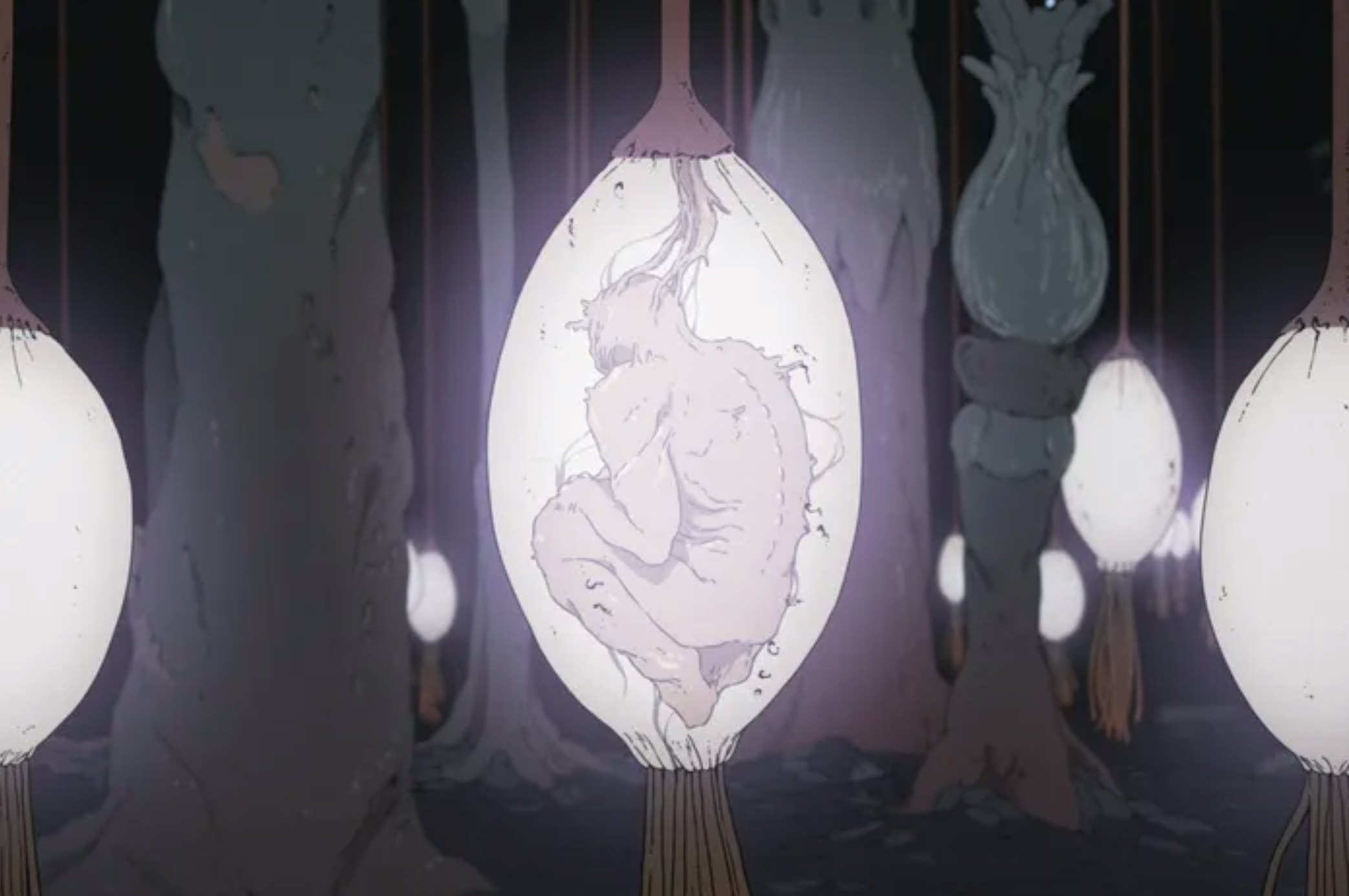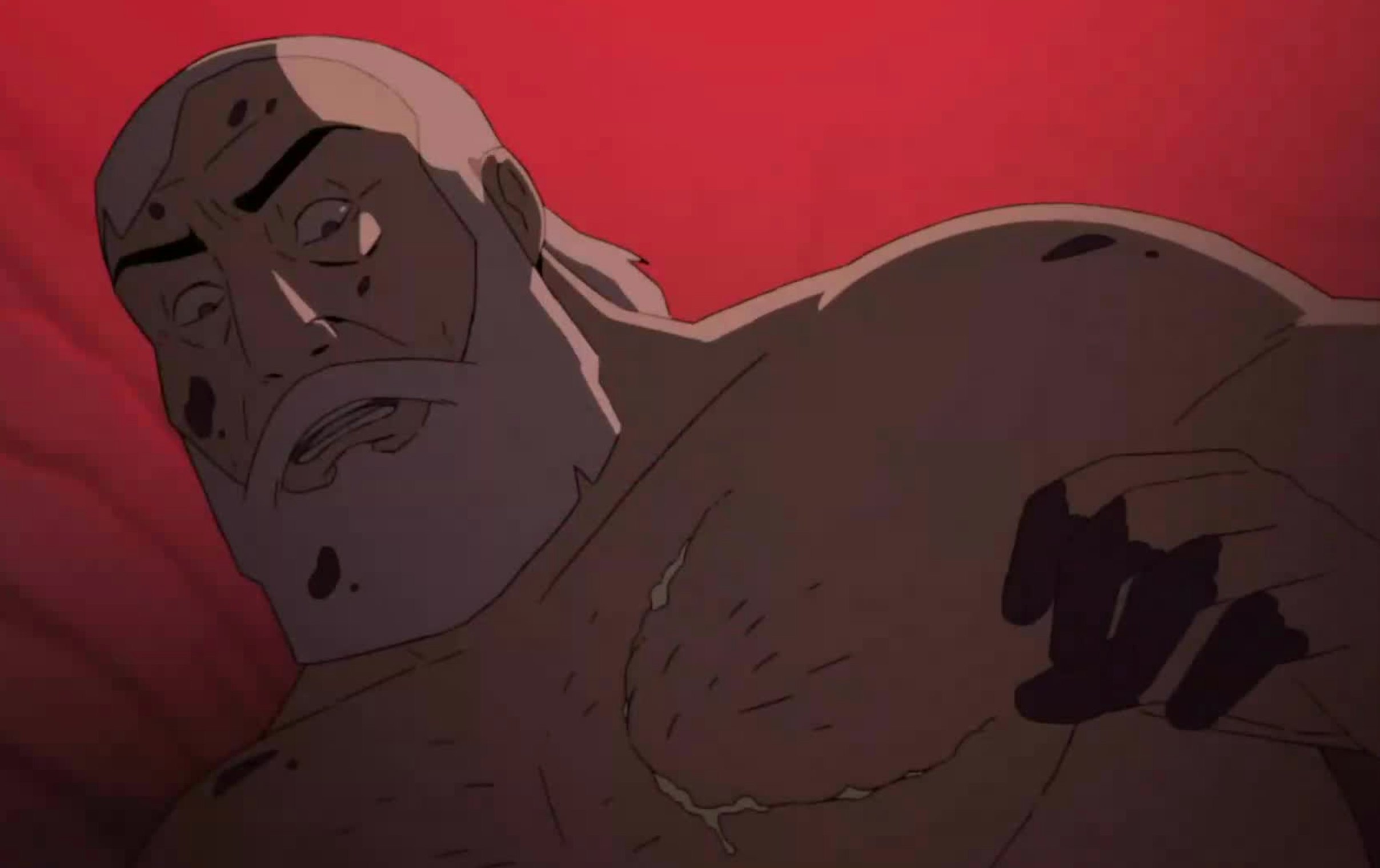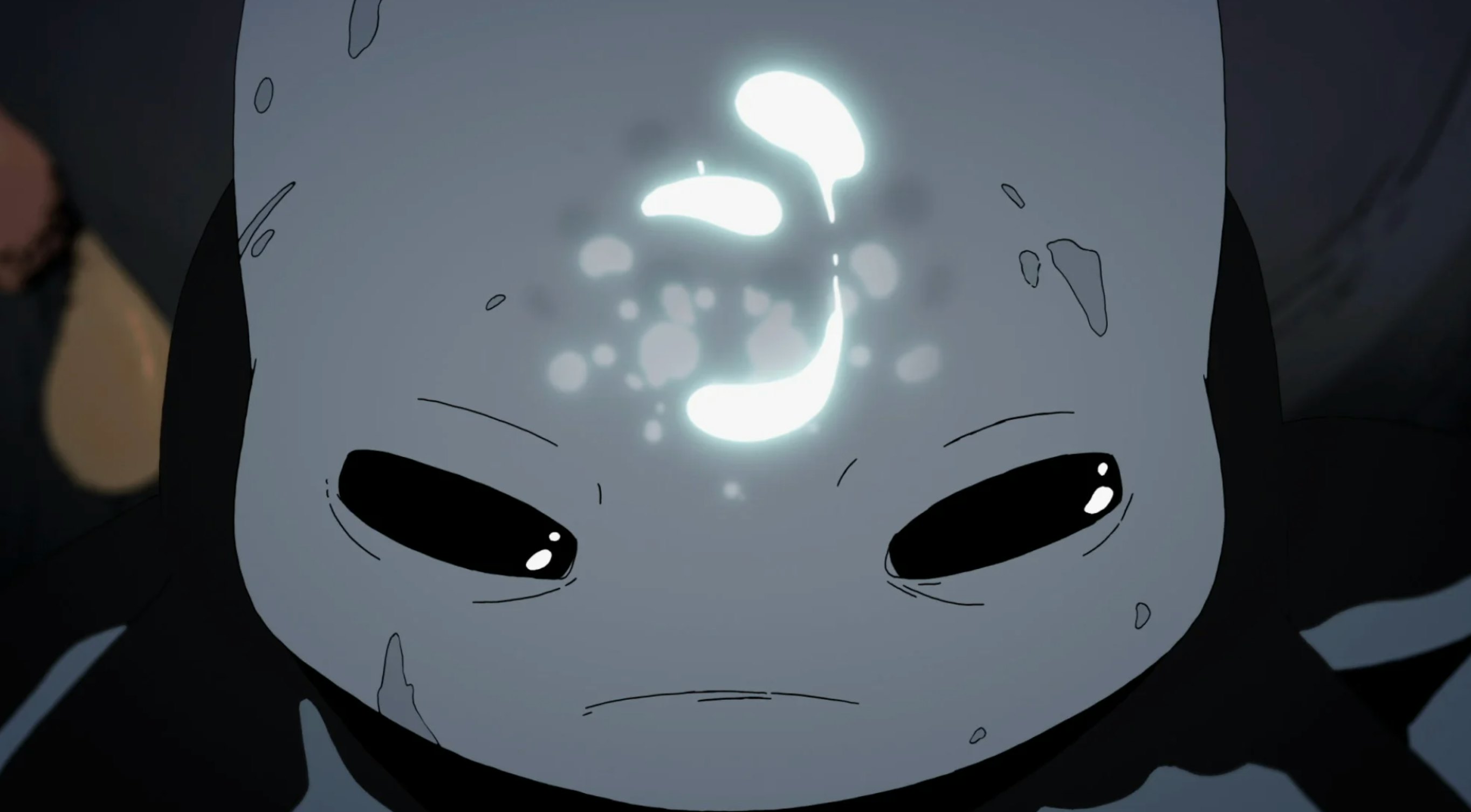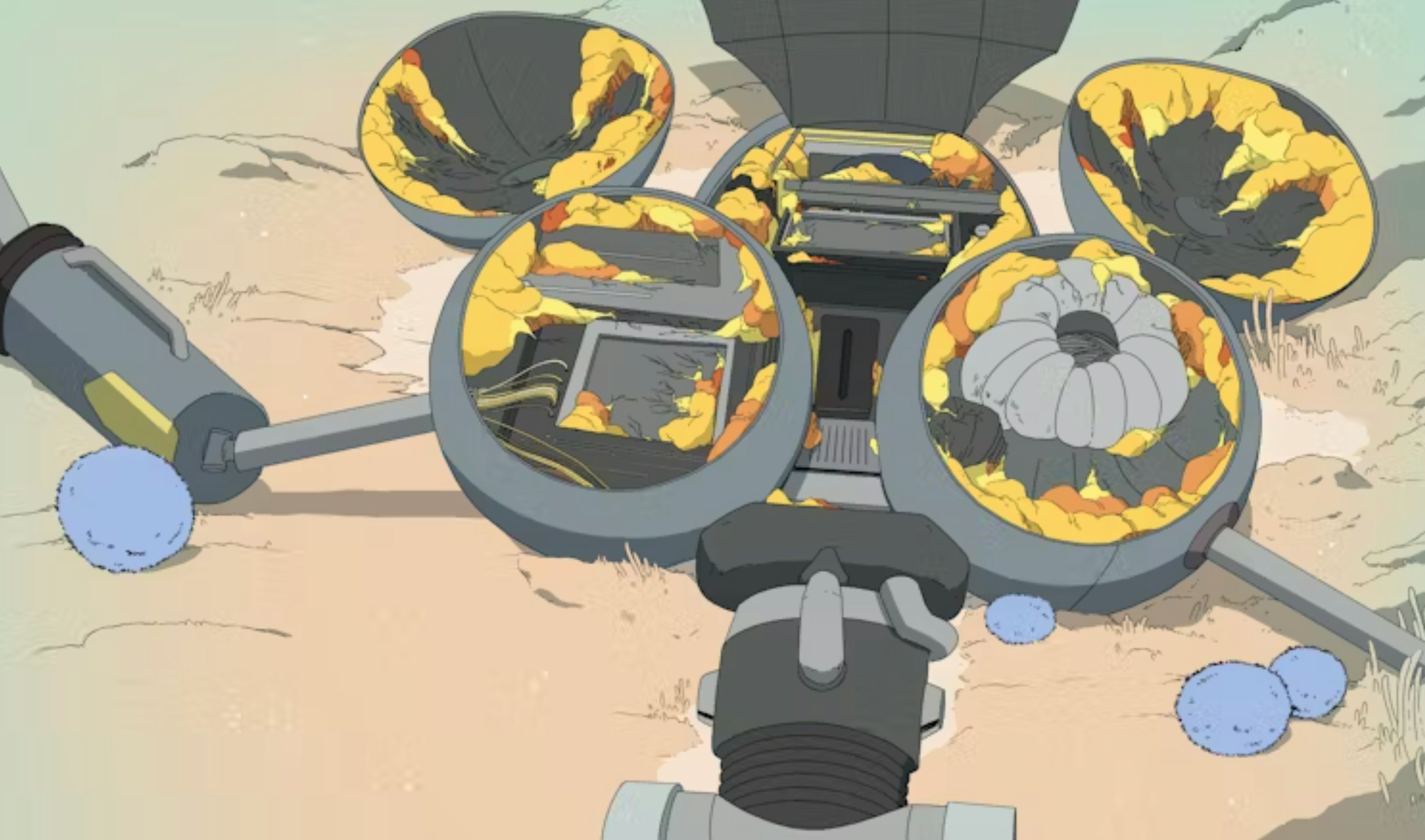
Sam hasn’t been feeling like himself lately. A day ago, he was almost dead. Now, he’s more energetic than ever as he explores the alien planet he’s been shipwrecked on, collecting mud for a shrine he’s compelled to build but can’t explain. When his friend Ursula confronts him about these changes, Sam notices a weird flap in the skin over his heart. Peeling it back, he reveals what could be described as a tiny cthulhu monster wrapped around his arteries.
Telling a story with no clear-cut heroes or villains, Scavengers Reign revels in the horror and wonder of transformation. Its most disturbing threats are motivated by biological instinct rather than morality. Instead of simply preying on the human protagonists, these alien creatures seek to change them into something new.
Set on the vibrant planet Vesta, the show follows a group of stranded humans from an interstellar cargo ship. In order to survive, they must adapt to their new environment. Sometimes this involves a relatively straightforward piece of problem-solving, like when the former crewmates Sam and Ursula hook bioelectric vines into their salvaged machinery. But these survivors also face more complicated interactions with the local wildlife, forming symbiotic or parasitic relationships against their will.
Animated with a gorgeously tactile, visceral attitude to audiovisual worldbuilding, Scavengers Reign is full of organisms that thrive by controlling or transforming a living host; a fruitful theme for sci-fi horror.

Over the course of Scavengers Reign Season 1, each of the main characters encounter some kind of parasite that drastically alters their lives. For Sam and Ursula, this begins when they meet Mascha, a human who’s been stranded on the planet for years. She’s adapted well to her new home, but her behavior is noticeably eccentric. Soon enough, we find out why.
While Sam is unconscious and recovering from some injuries, Mascha vomits up a black seed and implants it in his body. It hatches into a larva that burrows into Sam’s chest cavity, giving him boundless energy and compelling him to perform ritualized tasks, building a shrine to the entity his larval parasite will eventually become. It’s an elaborate twist on the mind-controlling zombie ant fungus, a real organism that inspired the fictional outbreak in The Last Of Us.
Even after Sam and Ursula figure out what’s wrong, there’s no obvious solution to Sam’s problems. The parasite is keeping Sam’s body alive for its own ends, and like Mascha, he develops an urge to cough up more seeds and infect other humans.

In another parasitic subplot, the show’s most unlikeable character, Kamen, embarks on an alarming partnership with a carnivorous panda/koala creature. Nicknamed “Hollow” by the show's creators, it’s a manipulative telepath that bewitches its victims with tempting dreams. Ordinarily preying on less complicated lifeforms, it's unprepared to handle constant input from Kamen’s damaged human psyche.
In exchange for nostalgic hallucinations of his ex-wife, Kamen provides Hollow with a continuous supply of fresh meat, creating a feedback loop of hunger, slaughter, and addiction. By the end of the season, Hollow has grown to a monstrous size, hosting Kamen in a womb-like compartment that shields him from reality. Hollow’s species isn’t meant to be this big or aggressive, but by absorbing Kamen, Hollow gains a distinctly human kind of malevolence. Kamen himself is the parasite here.

Coupled with some of the more traditional gore in Scavengers Reign, these parasite storylines offer a strong thread of body horror — a genre fascinated with physical transformation. The best body horror stories often involve some kind of identity crisis, with David Cronenberg’s The Fly being an iconically gruesome example. It’s a theme that calls back to the very dawn of horror cinema, with films like The Hands of Orlac (1924) and Dr. Jekyll and Mr. Hyde (1931) telling tales of self-destructive men who lose control of their minds and bodies. These stories can evoke dread and disgust without including a villain, meaning the protagonist can’t run or fight their way out of trouble. The threat comes from within.
This philosophy is very present in Scavengers Reign, as the human characters struggle to understand the unfamiliar rules of Vesta’s ecosystem. Sam’s descent into manic, parasite-induced compulsions is doubly disturbing because he and Ursula know exactly what’s happening to him but are powerless to stop it.
However the show’s most intriguing parasite/symbiote storyline follows a very different tone.

Traveling with their human boss Azi, the sweet-natured robot Levi plays a similar role to the droids in Star Wars. They’re a semi-sentient machine built for a specific purpose and treated as something between appliance and pet. This unequal power dynamic becomes relevant when Levi begins to develop unexpected emotions and thought processes. Azi discovers fungus infiltrating the robot’s circuitry and wants to remove the outside contaminant, but Levi resists, embracing the changes it brings.
Levi becomes more and more independent, expressing curiosity and wonder toward Vesta’s ecosystem. Then in the season’s final act, Levi undergoes a Swamp Thing-like transformation. After their original metal body is destroyed by Hollow/Kamen, they’re reborn as a biological lifeform, generating new baby Levis like seedlings. In the visual language of Vesta’s landscape, Levi has finally gained a soul, embodied by a type of glowing white flower that blossoms whenever a creature dies.

Considering the contrast in life experience between humans and robots in Scavengers Reign, Levi’s arc offers a thoughtful counterpoint to Sam and Kamen’s experiences. Technically all three of them are altered by alien organisms, but they have radically different reactions.
It makes sense for Sam and Ursula to be horrified by the prospect of a mind-control parasite. Like any adult human, they have a strong sense of identity and bodily autonomy. But that wasn’t the case for Levi, who was originally programmed for obedience and limited emotional scope. Vesta’s fungus ultimately sets Levi free, sparking a level of adaptation and rejuvenation that simply isn’t possible for a human — and adding a thoughtful new wrinkle to the body horror subgenre along the way.







